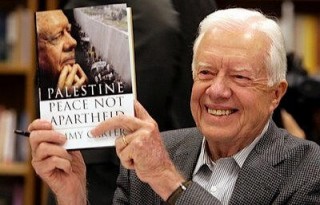ED NOTE: The following is Dr. Stephen Sniegoski’s response to Philip Giraldi’s article “A Tipping Point for Israel,”
 by Stephen Sniegoski
by Stephen Sniegoski
Philip Giraldi is one of the few heroes who dares to strenuously oppose the pro-Israel war party in the United States.
I rarely disagree with anything in his very informative articles. In fact, this is the first time that I can recall disagreeing with anything of significance. But I think he is being much too optimistic in his view that US support for a pro-Israel Middle East policy is moving in a downward direction.
Philip Giraldi, the executive director of the Council for the National Interest and an astute critic of America’s Israelocentric policy in the Middle East, recently made the case that United States support for Israel, and the concomitant Israeli power which depends on that support, has reached its tipping point and is now on an ineluctable downward slide. http://mycatbirdseat.com/2012/05/a-tipping-point-for-israel/
A “tipping point,” a term given wide publicity in the decade past by Malcolm Gladwell’s best-selling book with that title, is defined by Giraldi as a point “where physical momentum, inclined in one direction, reverses its course, stabilizes, and then begins to move the opposite way.” And the movement usually accelerates after reaching the “tipping point.” In Gladwell’s definition: “The word ‘Tipping Point’ . . . comes from the world of epidemiology. It’s the name given to that moment in an epidemic when a virus reaches critical mass. It’s the boiling point. It’s the moment on the graph when the line starts to shoot straight upwards. AIDS tipped in 1982, when it went from a rare disease affecting a few gay men to a worldwide epidemic.” http://www.gladwell.com/tippingpoint/
Thus, after citing examples of criticism of Israeli policies, Giraldi concludes: “So we have reached the point where the proverbial cat is out of the bag. Everyone, with the possible exception of the U.S. Congress, has become aware that there is something terribly wrong with Israel. In Israel itself, where there is often ferocious debate over the country’s policies, it is time for a reckoning. Does Israel want to become a normal state with correct relationships with its neighbors, including an independent Palestine, or does it want to continue down the road that it is pursuing, which is folly and will lead to ruin?” It is not apparent to me, however, that support for Israel has passed its peak and is now in an irreversible downward spiral; in fact, despite some criticism here and there, and much more so on the Internet than in the mainstream media, there does not really seem to be a decline at all.
That support for Israel continues to reign supreme in the US Congress, as Giraldi acknowledges, would seem to illustrate that the American populace is not sufficiently concerned about the issue as to make it politically significant.
Moreover, it is not simply the legislative branch of government where pro-Israel influence looms large, but also in the executive branch. While President Obama avoids implementing the Israel lobby’s call for military action against Iran, he has gone very far with harsh sanctions against that country, provided Israel with the most sophisticated weaponry, including an anti-missile defense that does not even exist for the United States, failed to pressure Israel into making concessions to the Palestinians, and had the US resist, and when necessary, veto all anti-Israel measures in the UN Security Council.
As New York Times columnist Thomas Friedman put it: “The only question I have when it comes to President Obama and Israel is whether he is the most pro-Israel president in history or just one of the most.” http://www.nytimes.com/2012/03/07/opinion/friedman-israels-best-friend.html
It should be pointed out that previous administrations have not been so favorably disposed toward Israel. When, in 1956, Israel along with France and Britain invaded Egypt, then ruled by Nasser–Israel’s foremost enemy–President Eisenhower quickly pressured those countries to agree to a cease-fire and a withdrawal of their forces.
John F. Kennedy opposed Israel’s secret development of the atomic bomb, which Israel considered vital for its national security.
The Carter administration allowed anti-Israeli resolutions to pass in the UN without using its veto or putting forth much opposition. Moreover, Carter sought to have Israel dismantle its West Bank settlements.
The elder George Bush, led by his Secretary of State James Baker, sought to pressure Israel to undertake a withdrawal from the West Bank by threatening to withhold loan guarantees for new housing for Soviet immigrants unless Israel ceased building settlements in the occupied territories. The elder Bush also was so bold as to criticize Israel’s supporters for lobbying on this issue.
In fact, it was only with the accession of the younger George Bush that US policy abandoned the view that the West Bank was occupied territory from which Israel should withdraw.
And despite Obama’s high-sounding rhetoric regarding Palestinian rights and aspirations, which some have interpreted as signaling a more balanced approach on the Israel/Palestine issue, the Obama administration has continued the pro-Israel policy of George W. Bush. In short, recent history seems to show that US support for Israel has moved ever upward, though faced with various forms of criticism at different times.
But it should be pointed out that in the past, American support for Israel had not had such a detrimental impact on American well-being as it does today.
Middle East policy was important but not the central issue during the Cold War, which revolved around the Soviet Union. Israel, at least during the latter stages of the Cold War, presented itself as one of America’s few allies in that region. Israel’s foreign policy interests, however, did not exactly mesh with America’s Cold War division of friends and enemies in the Middle East. Some of Israel’s enemies were pro-Soviet, while others were allies of the United States, such as Saudi Arabia. Support of the latter reflected the vital security need of the United States to keep the oil resources of the Middle East open to the West and free from Soviet domination. This ineluctably meant that the United States would support enemies of Israel.
By the early 1980s, when Saddam’s Iraq, which had been pro-Soviet, turned away from its erstwhile benefactor, the United States began to support it in its lengthy war against the nascent Islamic Republic of Iran, which then seemed to pose a revolutionary threat to the stability of oil production in the region. Israel, in contrast, saw Saddam’s Iraq as a major enemy and covertly backed Iran during that conflict. During this period the United States did support Israel on the issue of the Palestinians, but it was only since the end of the Cold War that America has adopted a clearly Israelocentric policy for the entire Middle East region, in which America’s enemies coincide with those of Israel. Moreover, the Middle East has become the central concern of overall American foreign policy.
Since Israeli interests seem to have become the cynosure of American foreign policy in the Middle East, and are being pushed by elements who have openly identified with Israel, it would be reasonable to assume that this would have inevitably generated a considerable backlash in the United States.
For the obvious question should be: Is the US pursuing its war agenda in the Middle East to defend its own interests or those of a foreign country? But what stands out to this observer is not the existence of some criticism of Israel and its lobby in the mainstream, but the very paucity of that criticism, which is inevitably countered not by reasoned argument but by a barrage of misrepresentation, character assassination, vituperation, and outright falsehood centering on the lethal charge of “anti-Semitism.”
The current Iran controversy is the first time where it has become apparent that the Israel lobby is pushing the US into an actual war to aid Israel, with little effort to disguise this fact.
Although the enhancement of Israeli security was behind the US war on Iraq, which was driven by the pro-Israel neocons, the welfare of Israel was kept far in the background, if mentioned at all, by the war’s proponents.

Rather, the justification for war was couched in terms of American security, in large measure, Saddam’s mythical WMD threat.
With Iran, the situation is radically different. Politicians even openly come out and say that the US must stop the Iranian nuclear program because Israel faces destruction. The alleged danger to the United States is often a mere afterthought.
Among the sparse criticism of the Israel lobby and Israel itself, even the most prominent works have had but short life spans and then only for limited audiences, before falling from view.
Mearsheimer’s and Walt’s essay and book on the Israel lobby gained some attention among that tiny minority that focuses on foreign policy issues, but are rarely mentioned today even in those circles.
 Jimmy Carter’s expose of Israel’s mistreatment of the Palestinians likewise gained some attention, which had the effect of his being smeared, denied a significant place in the 2008 Democratic Convention, and being essentially forced to make a humble apology for offending American Jews.
Jimmy Carter’s expose of Israel’s mistreatment of the Palestinians likewise gained some attention, which had the effect of his being smeared, denied a significant place in the 2008 Democratic Convention, and being essentially forced to make a humble apology for offending American Jews.
The most recent criticism of Israel by liberal Zionist Peter Beinart in his new book, “The Crisis of Zionism,” has gained some attention among the (largely New York) intellectual elite, and, as Giraldi points out, has been reviled by the pro-Zionist establishment.
Giraldi, apparently trying to appeal to Jewish liberals, temporarily seems to identify with the liberal Zionist myth adhered to by Beinart that Israel was better in the past: “Israel no longer represents the liberal and humanistic values that they themselves cherish.” But in reality the Zionists were never humane to the Palestinians, especially when they expelled them by terror tactics in 1948, prohibited their return, and confiscated their property. Giraldi does not ignore this when he refers to a “dark side of Israel’s story.” But a Jewish exclusivist state, which is Israel’s raison d’être, simply could not be created with a large body of non-Jews.
 As M. Shahid Alam emphasizes in his excellent book, “Israeli Exceptionalism: The Destabilizing Logic of Zionism,” “the germ of the Zionist idea, its core ambition—clearly discernible at its launching—[has been] to create a Jewish state in the Middle East by displacing the natives.” http://bit.ly/JRp0ou Those Palestinians who remained in Israel were treated, at best, as second class citizens.
As M. Shahid Alam emphasizes in his excellent book, “Israeli Exceptionalism: The Destabilizing Logic of Zionism,” “the germ of the Zionist idea, its core ambition—clearly discernible at its launching—[has been] to create a Jewish state in the Middle East by displacing the natives.” http://bit.ly/JRp0ou Those Palestinians who remained in Israel were treated, at best, as second class citizens.
In an earlier article, “The J Street Scam,” Giraldi astutely pointed out that the liberal Zionism of “J Street” http://mycatbirdseat.com/2011/03/philip-giraldi-the-j-street-scam/ only “differs from AIPAC in tone, not in substance.” It so happens that Beinart is closely tied to J Street, which is promoting his new book.
While Beinart talks of abandoning Jewish West Bank settlements, he maintains that East Jerusalem, which has a majority of the Jewish settlers, must be maintained by the Jewish state. This point alone would make any “peace offer” unacceptable to the Palestinians. In essence, the effect of the Beinart program, if adopted by Israel, would improve the image of Israel but would never be implemented—which more knowledgeable liberal Zionists must recognize.
It should be added that Beinart makes no mention about providing Palestinians with real equality in Israel itself, which he seems to assume already exists. In short, Beinart’s “peace” proposal can serve as an effective defense of the status quo since unlike the Likudnik confrontational rhetoric it is wrapped in the garb of an Israeli concession.
In summary, what is most significant about the current criticism of Israel and the Israel Lobby is that it has been sparse and rather inconsequential. This condition should be contrasted with the rapid spread of antiwar opinion during the Vietnam War where the “tipping point” scenario would be very applicable. That criticism, in large part, began in the mid-1960s among Leftists on a few American campuses and then in a very short time became the dominant view in most colleges and universities outside the South.
Opposing the Vietnam War essentially became considered de rigueur for respectable, forward-thinking people. By 1968, anti-war candidates (primarily Eugene McCarthy and Robert Kennedy) were running for the Presidency and by the early 1970s public opinion would force the United States to pull out troops from Vietnam.
Whereas opposition to the Vietnam War became very quickly a primary political issue, America’s Israelocentric Middle East policy has not generated significant political opposition as almost all presidential candidates (Ron Paul being the lone exception among major candidates) and members of Congress pledge to support Israeli interests. If nothing political has been achieved so far—and Mearsheimer’s and Walt’s “Israel Lobby” essay came out in 2006 and book in 2007—there is no evidence that would lead to the conclusion that rapid change is about to occur.
 None of what I have written is intended to mean that opposition to the Israel lobby and its policies for America is absolutely hopeless and that one should simply abandon the effort.
None of what I have written is intended to mean that opposition to the Israel lobby and its policies for America is absolutely hopeless and that one should simply abandon the effort.
Efforts by those like Phil Giraldi and his group the Council for the National Interest have helped to prevent the situation from becoming even worse. One needs to be reminded that the US has not done everything sought by the Israel lobby especially in regard to making war on Iran.
Avoiding a destructive war has been a major accomplishment. Maybe in the future it would be possible to move on the offensive and achieve something that approximates a balanced United States policy in Middle East that is attuned to the American interest and respects international law. For now, however, even preventing the worst from coming about should be seen as an achievement.
Editing: Debbie Menon
 ABOUT THE AUTHOR: Dr. Stephen J. Sniegoski, Ph.D. earned his doctorate in American history,with a focus on American foreign policy, at the University of Maryland. His focus on the neoconservative involvement in American foreign policy antedates September 11, 2001. His first major work on the subject, “The War on Iraq: Conceived in Israel” was published February 10, 2003, more than a month before the American attack. Sniegoski is the author of “The Transparent Cabal: The Neoconservative Agenda, War in the Middle East, and the National Interest of Israel”. Read more articles by Stephen J. Sniegoski at: http://home.comcast.net/~transparentcabal/
ABOUT THE AUTHOR: Dr. Stephen J. Sniegoski, Ph.D. earned his doctorate in American history,with a focus on American foreign policy, at the University of Maryland. His focus on the neoconservative involvement in American foreign policy antedates September 11, 2001. His first major work on the subject, “The War on Iraq: Conceived in Israel” was published February 10, 2003, more than a month before the American attack. Sniegoski is the author of “The Transparent Cabal: The Neoconservative Agenda, War in the Middle East, and the National Interest of Israel”. Read more articles by Stephen J. Sniegoski at: http://home.comcast.net/~transparentcabal/
A Tipping Point for Israel
Philip Giraldi, May 14, 2012
http://mycatbirdseat.com/2012/
05/a-tipping-point-for-israel/ A tipping point is where physical momentum, inclined in one direction, reverses its course, stabilizes, and then begins to move the opposite way. Those of us who have been arguing for a sane United States foreign policy in the Middle East have well understood that the odds on shifting the prevailing narrative have been heavily against us thanks to the overwhelming resources possessed by a powerful domestic lobby. Ten years ago in America, it was impossible to place even a letter in a mainstream newspaper or magazine that was in any way critical of Israel. Apart from Pat Buchanan, no one on television provided a critique of Israel and its policies. In the U.S. media, Israel was ever the beleaguered little democracy surrounded by savage Arabs.
But then, all of a sudden, the conspiracy of silence began to break down. It began with the revisionist history of the antecedents of the Iraq War as that conflict continued to drag on. Many began attributing Washington’s initiation of the fighting, at least in part, to Israeli interests. Philip Zelikow, chief counsel for the 9/11 Commission Report, famously noted in March 2004 that the war was “to protect Israel,” surely an exaggeration but containing more than a kernel of truth. Many also began to observe that the agitation for a new war with Iran was following the same pattern, with supporters of Israel leading the charge.
In 2006, former President Jimmy Carter published Palestine: Peace Not Apartheid. It provoked considerable outrage and highly publicized resignations from the board of the Carter Foundation together with charges that Carter was supporting Palestinian terrorism. But the big breakthrough came with the publication of Stephen Walt and John Mearsheimer’s The Israel Lobby and U.S. Foreign Policy in the following year. It became a New York Times best-seller, and it suddenly became acceptable to talk about Israel without the usual bromides. For the first time, people in America were taking notice of the power of the Israel lobby and the inherent downside for U.S. national interests.
Driven by the prospect of unending warfare in an attempt to remake the Muslim world by force, letters and op-eds critical of Israel and its policies began to appear in the mainstream media. There weren’t a lot, mind you, and they were always “balanced” by more numerous contrary commentaries, but there were enough to demonstrate that a shift was taking place. Mainstream Jewish organizations, always vigilant in defense of what they have perceived as Israel’s interest, resorted increasingly to discrediting critics by calling them “anti-Semites.” Indeed, they succeeded in equating any criticism of Israel with anti-Semitism and even managed to pass legislation in Canada and several European nations that made any criticism of Israel ipso facto a hate crime.
Some American Jews have always been bothered by the dark side of Israel’s story, beginning with the Nakba expulsion of the Palestinians from their homes and including the more recent settlement policy, “security” wall, and the denial of civil and human rights to the Arabs living in Israel and the occupied territories. They were convinced, correctly, that Israel had no intention to permit the creation of a viable Palestinian state. Many began to protest, though their voices were at first confined to the alternative media and they had to work through many progressive groups that were advancing a much broader peace agenda in response to George W. Bush’s horrific “global war on terror.”
But now we Americans have finally reached our tipping point. Recently Peter Beinart, a Zionist and defender of Israel for many years, released The Crisis of Zionism, which explains how Israel has become an armed camp dedicated to repressing and even expelling its Palestinian helots. As a liberal Jew, he rejects the militant values that drive the Israel of Prime Minister Benjamin Netanyahu and has even gone so far as to support an economic boycott of Israel, similar to the pressure that was put on South African apartheid. The book has predictably provoked a firestorm of criticism from the pro-Israel establishment, but Beinart is not alone. Tom Friedman and Paul Krugman of The New York Times, both Jewish and both longtime friends of Israel, have voiced the same concerns, namely that Israel no longer represents the liberal and humanistic values that they themselves cherish. It has been noted in passing that young American Jews increasingly do not view Israel in positive terms, a sign, if one was needed, that the older generation that believes Israel is always right, no matter what it does, is passing into history.
And it does not end there. Even the mainstream media is now, perhaps reluctantly, on board. On April 22, 60 Minutes, the most watched television news and commentary program in the United States, aired a segment on Israeli persecution of Christians. The program was a real shock for the many fundamentalist Christians who have viewed Israel through rose-tinted glasses. Many evangelicals have promoted the myth that Israel is actually a protector of Christians, which it most emphatically is not; it seeks instead to marginalize them and force them to emigrate, as the 60 Minutes program demonstrated. Israeli Ambassador Michael Oren, who tried to kill the story and called it a “hatchet job,” was interviewed as part of it. His performance was alternately smug and angry, and it is widely regarded as a public relations disaster. He even said that mainstream Christian churches are “known for their anti-Semitism.”
Benjamin Netanyahu’s office supported Oren’s contention that the broadcast was a “threat to Israel.” It was Netanyahu’s second venture into public relations in a short time, having previously denounced German Nobel Prize–winning author Gunter Grass. Netanyahu banned Grass from traveling to Israel and said that his writings had “hurt Israel profoundly.” Netanyahu was responding to Grass’s rather mild declaration in a poem that the Jewish state’s nuclear program is a threat to an “already fragile world peace.”
Netanyahu knows that the tide is running against him and everything he represents, particularly as the criticism from former senior officials in his own country continues to mount, but he is too obdurate to do what must be done. One of Israel’s darkest secrets is the extent to which young, educated Jews are fleeing the country for greener pastures, most notably the United States. By some guesstimates, one third of university-educated second- and third-generation Israeli Jews have left the country. They are leaving behind the recent Russian immigrants, many of whom are not actually religiously or ethnically Jewish, and the Islamophobic racists who constitute the core of the hard right in Israel. Israel publishes no statistics on the brain drain, which has intensified the country’s demographic problem and lessened its competitiveness.
So we have reached the point where the proverbial cat is out of the bag. Everyone, with the possible exception of the U.S. Congress, has become aware that there is something terribly wrong with Israel. In Israel itself, where there is often ferocious debate over the country’s policies, it is time for a reckoning. Does Israel want to become a normal state with correct relationships with its neighbors, including an independent Palestine, or does it want to continue down the road that it is pursuing, which is folly and will lead to ruin? The choice is ultimately Israel’s, but, for the first time, Americans are actually beginning to talk and write freely and openly about the problem.
ATTENTION READERS
We See The World From All Sides and Want YOU To Be Fully InformedIn fact, intentional disinformation is a disgraceful scourge in media today. So to assuage any possible errant incorrect information posted herein, we strongly encourage you to seek corroboration from other non-VT sources before forming an educated opinion.
About VT - Policies & Disclosures - Comment Policy



